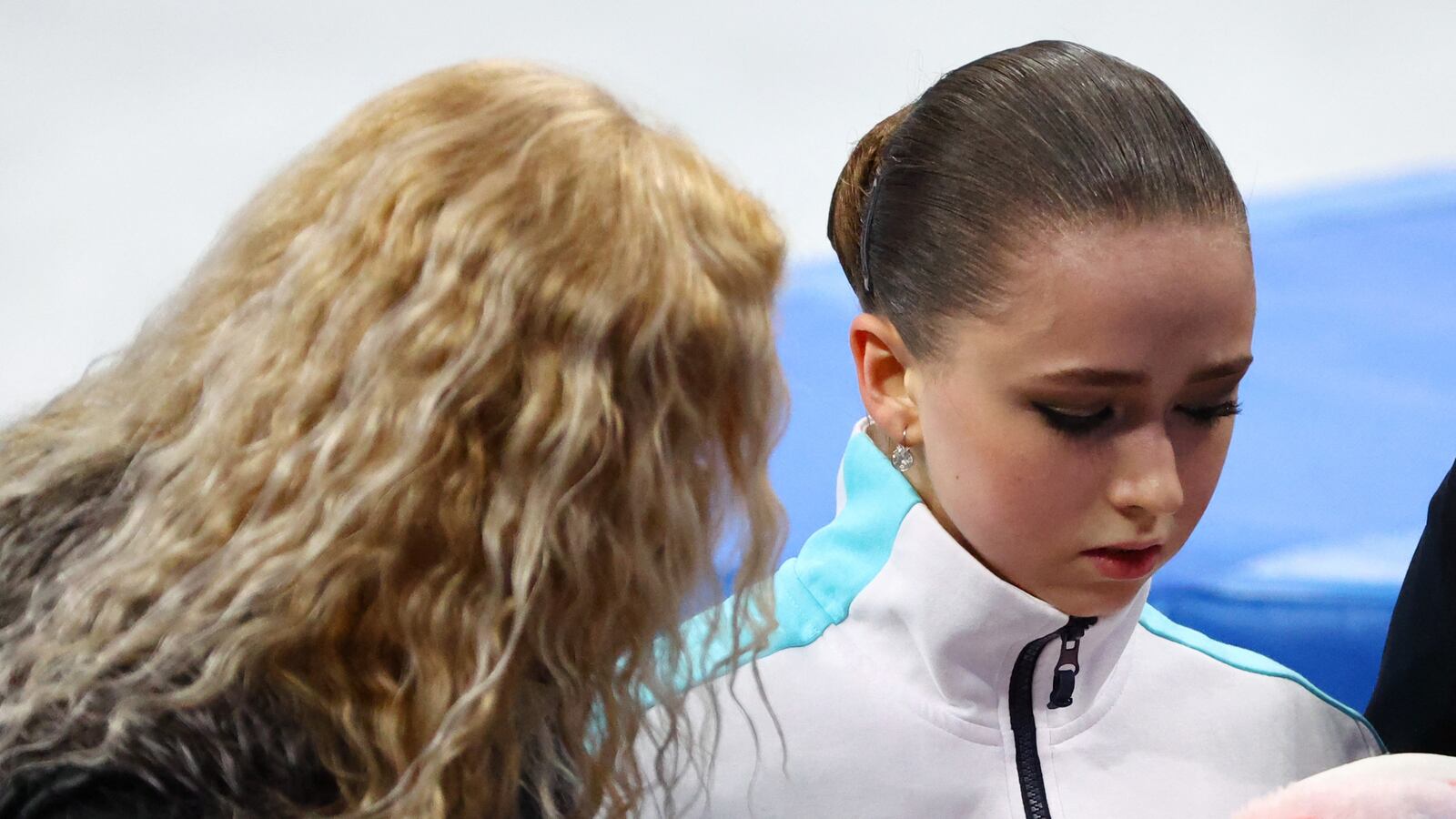Russia’s top figure skating coach won praise from the Kremlin for her “harshness” on Friday after shocking video emerged of her berating 15-year-old Kamila Valieva for failing to win a gold medal at the Beijing Olympics.
Valieva has been at the center of an Olympic doping row after a failed drugs test and the pressure finally got to her on Thursday as she crumbled and fell in the long program of the individual event, tumbling from first place to fourth.
Valieva left the ice in tears, only to be confronted rinkside by coach Eteri Tutberidze. “Why did you let it go like that? Why did you let it go?” Tutberidze asked angrily. “Why did you stop fighting? Well, explain! You let it go after the axel.”
Tutberidze has produced a string of Olympic and world champions over the past decade and is known for pushing her young charges to their limits at her Moscow talent factory.
But her treatment of Valieva after her humiliating meltdown in Beijing shocked viewers around the world, among them Thomas Bach, the IOC president, who was watching on TV in Beijing. Bach told a press conference on Friday he had found the response to Valieva’s performance “disturbing” to watch.
“When I afterwards saw how she was received by her close entourage...it was chilling to see this,” Bach added, according to a report from Reuters.
“Rather than giving her comfort, rather than to try to help her you could feel this chilling atmosphere, this distance and if you were interpreting the body language of them, it got even worse because this was even some kind of dismissive gestures.”
But if sports fans around the world were shocked by Tutberidze's behavior, those watching in the Kremlin were firmly behind the coach and her methods.
Dmitry Peskov, Putin’s presidential spokesman, took time out from his normal schedule–mocking the West over its fears of a bloodbath in Ukraine or dismissing the threat of sanctions against his boss–to defend Tutberidze.
“Thomas Bach is a very authoritative person in the sports world. Of course, we respect his opinion but we do not necessarily agree with him,” Peskov told reporters on a conference call.
“He doesn’t like the harshness of our coaches, but everybody knows that the harshness of a coach in high-level sport is key for their athletes to achieve victories.
“And we are seeing that the athletes are achieving victories. So let’s be proud of our winners, congratulate our medalists. Valieva was fourth but in high-level sport, the strongest wins.”
Peskov is right that Tutberidze does produce winners. Valieva lost out on a medal but gold and silver went to two other skaters from Team Tutberidze, Anna Shcherbakova and Alexandra Trusova.
In its ruling on Monday that Valieva should be allowed to carry on competing in Beijing despite the failed drugs test, the Court of Arbitration (CAS) for sport had emphasized her age; at 15 she is officially a “protected person” under anti-doping rules who cannot automatically be held liable for substances found in her blood samples.
One result of the Valieva doping row is to provoke a debate about introducing an age limit at the Olympics, which might mean she will be the last 15-year-old allowed to skate at the Winter Olympics.
Among those backing the suggestion is American Mariah Bell, who placed 10th in Beijing and who is, at 25, the oldest U.S. national champion in almost a century.
For Bell, and others, insisting that skaters be at least 18 years old would be one way to stop the production line of “disposable” young Russians–mostly coached by Tutberidze–who shine brightly for a single Olympics or world championships only to be replaced by the next in line.
“You want these athletes to have an opportunity to have this be a profession, not a one-year run at it,” Bell said. “If we had an age limit, I think it would promote that idea of longevity and somebody being 25 wouldn’t be shocking at an Olympics.”
In his press conference on Friday, Bach gave his backing to the idea, although he said it would need to be thought through properly and the final decision would be up to the International Skating Union rather than the IOC.
With the figure skating wrapped up in Beijing, Valieva now has to persuade anti-doping officials that she is not a drugs cheat, while her coaches also face an international probe.
Valieva’s lawyer told the CAS panel the skater must have accidentally ingested the banned angina drug trimetazidine, which is taken by her grandfather for a heart condition (although news that she declared two other legal heart medications on an anti-doping form prompted accusations of systematic doping from U.S. officials).
The CAS on Friday released its full ruling on the Valieva case, a 41-page document laying out the competing arguments for and against her suspension and the reasons for the decision to let her skate on.
The overwhelming conclusion of the three-member arbitration panel appeared to be that Valieva was a victim: of badly worded anti-doping regulations; of a laboratory that failed to test her sample for weeks; and of a sport in which young stars might have only one chance of glory.
She was also, it appears, a victim of COVID-19 and the super-infectious Omicron variant.
The CAS ruling describes how Valieva’s anti-doping sample was taken in Russia on Dec. 25 and sent to an internationally accredited laboratory in Stockholm, where it sat for weeks before being tested.
If the laboratory had tested it more promptly, the case would have been heard immediately and she could have escaped with a reprimand or even have been let off entirely, leaving her free to compete in Beijing.
The laboratory in question said the delay was due to a lack of staff when the sample arrived in Stockholm on Dec. 29, which continued throughout January as the Omicron virus ripped through the Swedish population.
The CAS arbitrators were unimpressed: “None of this is the fault of the athlete and it has put her in a remarkably difficult position where she faces a lifetime of work being taken from her within days of the biggest event of her short career.”





